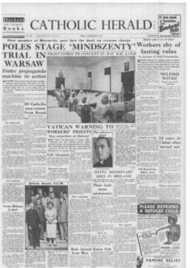Page 6, 18th September 1953
Page 6

Report an error
Noticed an error on this page?If you've noticed an error in this article please click here to report it.
Tags
Share
Related articles
2 Visits To Cathedral
Broadcasting
A Laugh With The Law
Need A Swivel Chair
Radio
Looking and Listening
Txj With the closing of the Radio V Exhibition, the depression created by the variety shows televised during those two weeks is beginning to lift. I absolve 'Terry-Thomas of any contribution to the gloommaking; his amiable fooling is always welcome. Most of the dreariness came from the female vocalists who rely on ogling, grimacing and sickly coyness to disguise the fact that they just can't sing.
As if to make up for the lowering of viewers' spirits during the Radio Exhibition's variety performances, what a grand job the B.B.C. made of the Edwardian Music Hall on Monday night, an all-round excellent entertainment produced by Barney Colehan.
To single out one artist because of her youth, simple charm and heavenly voice, and as an example to other feminine soloists, I mention Mary Millar, and plead with the B.B.C., "Once you have found her, never let her go" and never, never let her pick up the cheaper tricks of the entertainment trade.
It would be a salutary experience if the female soloists whom viewers have suffered during the Radio Exhibition were gathered together to see and hear this 17-year-old newcomer.
Looking to the future, I am anticipating with much pleasure Gerard Tyrell's play "High Horse." to be televised on September 22. An Irishman, educated at Ampleforth, and now in TV's Drama Department, his play "Celestial Fire" was judged the most successful new play of 1948.
He is no stranger to the stage, radio and television screen. He regards TV as far the most interesting medium in which a dramatist can work and much enjoyed adapting the stage version of "High Horse" to its greater flexibility on the screen. He was for a time on the editorial staff of this newspaper until the war, when he was a staff officer in A.A. Command. M. M.
RADIO. Somebody's gu a rd ia n angel — mine, I suppose — suggested to me to listen to Henry Reed's "A Very Great Man Indeed, ' produced by Douglas Cleverdon on the Third. Just before, the Vienna Philharmonic Orchestra from Edinburgh had been coming through very
badly and I was prepared to have to turn off the play as well. I'm glad I didn't.
It was about "the late Richard Shewin, 'the poets' novelist,' " and his biographer, Herbert Reeve (Hugh Burden), was visiting the great man's relations and friends to get an idea of his character.
"Dear me, I've never heard of Richard Shewin," I was thinking as I listened to the beginning. But when the earnest biographer got upstairs to see the permanently bedded brother of the late R.S., and after his meeting with the sister-in-law and her cats, 1 realised that either it was meant to be funny or something had gone wrong somewhere. And funnier and funnier it grew, and more and more enjoyable.
find it hard to decide which incident I enjoyed most—Mary O'Farrel as the composeress, Norman Shelley being a contemporary novel is t, Harry Hutchinson as the Irish poet, or the gl rious ending with the late novelist's nephews singing "Don't Hurt My Heart," a very tearful lyric in the Frankie Leine manner. Repeat, please.
"Women's Hour" returned to the Light this week and 1 was on the whole thankful to be rid of "Break for Summer" which had taken its place. It had consisted of a serial, a gramophone choice and a rather sickly "Old Folk's Corner"—a semireligious quarter of an hour.
Do "Old Folks" really like so many hymns and versicles presented in this particularly cloying way? It all seemed very "comforting" and "gooey," while containing no hint of preparation for after death, and yet there was nothing lively, though liveliness is one of the qualities of mind most frequently found in old people.
"Children's Choice" was a little better on Saturday, with Maurice Denham as an amusing "discjockey." But even he let in one of those nauseating croon a y songs which I would have thought that no normal child could really care for. His other records were all of the nice, noisy type, full of trains, golliwogs, teddy bears or cowboy s. Children seem very rarely to ask for classical music.
Joan Newton.
blog comments powered by Disqus









